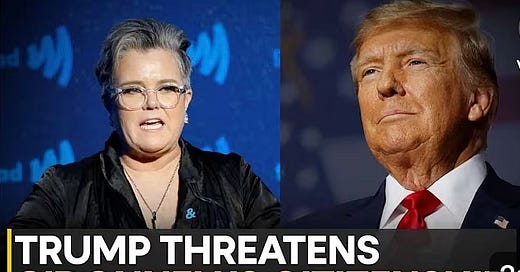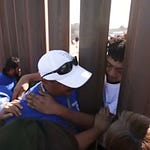The Paper Fortress: Notes on Citizenship in the Age of Rage
By Earl Cotten for The Earl Angle Newsletter
The documents arrived in a manila envelope, thicker than anticipated. Inside lay the accumulated proof of belonging: a birth certificate from Commack, Long Island, dated 1962; school records; voter registration; the faded passport bearing stamps from a dozen vacations now rendered sentimental journeys. Rosie O’Donnell had assembled these papers, I imagine, not as an act of defiance, but as a quiet, necessary ritual. A reaffirmation of the tangible against the ephemeral fury emanating from the White House. The President of the United States had declared, via the digital ether of Truth Social, that he was “giving serious consideration to taking away her Citizenship.” He called her “a Threat to Humanity.” He suggested she remain in Ireland. It was July 12, 2025, a Tuesday, and the air conditioning in the Dublin apartment where she now lived hummed against the damp Irish summer outside. She posted a photograph of the documents on Instagram. Her caption: “go ahead and try, king joffrey with a tangerine spray tan. i’m not yours to silence.” The defiance was performative, perhaps necessary armor, but the act of gathering the papers, of holding the physical evidence of a life lived entirely within the borders of a single nation, felt like something else entirely. It felt like checking the locks at midnight.
I.
Citizenship, we tell ourselves, is bedrock. It is the ground beneath our feet, the air we breathe, the passport we present at borders. It is defined by the Fourteenth Amendment with the stark clarity of a birth certificate itself: “All persons born or naturalized in the United States, and subject to the jurisdiction thereof, are citizens of the United States and of the State wherein they reside.” We learn this in school. We recite it. We assume its permanence, its resistance to the whims of men. Yet permanence is an illusion easily shattered by the right voice speaking the right words into the right void. Donald Trump’s threat against Rosie O’Donnell was not a policy proposal. It was not a legal argument. It was a statement of intent, a testing of boundaries, a flare shot into the gathering political dusk. It landed with the dull thud of the inevitable, the culmination of a decades-long personal feud metastasizing into a constitutional crisis. He had questioned the citizenship of Zohran Mamdani, a naturalized mayoral candidate, earlier. He had signed an executive order in January, attempting to gut birthright citizenship for children born to non-citizens. The threat against O’Donnell was simply the next logical step in a project of narrowing the definition of who belongs, of who is truly American. It was the weaponization of belonging itself.
The White House, predictably, offered no clarification. No pathway. No legal rationale. The silence was the point. The threat existed not in the realm of statute or precedent, but in the chilling air of possibility it created. Could he? Would he? The question hung, poisonous. Legal scholars – Steve Vladeck at Georgetown, Amanda Frost at UVA – rushed to offer the balm of precedent: Afroyim v. Rusk (1967). Citizenship, once acquired, cannot be stripped away by the government without the citizen’s consent. Vance v. Terrazas (1980). Intent to relinquish must be proven. Rosie O’Donnell, born in Commack, New York, had never renounced. There was no fraud. The scholars spoke of constitutional bedrock. Yet, standing on that bedrock, one could feel the tremor. The threat, however legally void, was a powerful solvent, dissolving the assumption of safety that citizenship is meant to provide. It whispered a corrosive question: What if the ground can shift beneath you?
II.
Rosie O’Donnell had already left. She arrived in Ireland in January 2025, shortly after the inauguration. “I knew after reading Project 2025 that if Trump got in, it was time to leave,” she told CNN, her voice carrying the flat affect of a decision made not in panic, but in cold appraisal. The reasons were specific, intimate: the safety of her 12-year-old nonbinary child in a climate she perceived as increasingly hostile. “It’s been heartbreaking to see what’s happening politically,” she said. The move was facilitated by the very lineage Trump seemed to disdain: her father was born in Ireland. Blood and soil, but not his kind. She claimed Irish citizenship through descent, a tangible connection to another place, another possibility. Dublin offered rain-slicked streets, a certain anonymity, and a distance measured in more than miles. From there, she continued to critique the administration. Days before Trump’s threat, she had blamed him, fiercely and publicly, for deaths during Texas floods, citing “gutted” warning systems. Her voice still carried across the Atlantic. It was a sound he could not abide. The feud, a poisonous vine entwining their public personas since 2006 when she called him a “snake-oil salesman” on The View, had found a new, more dangerous dimension. It was no longer just about insults (“a pig,” “loser”); it was now about the core of identity.
Ireland. A green refuge. A place of ancestors. Yet, the act of relocation, the acquisition of a second passport, while a rational response to perceived danger, also carries its own subtle weight. It is an admission, however unspoken, of diminished faith in the first. One packs belongings, arranges shipping, learns new customs, all the while carrying the ghost of the life left behind. The Irish citizenship was a pragmatic shield, yes, but its very necessity underscored the vulnerability she felt to the whims of power back home. The manila envelope of documents was a declaration of what is, but the Irish passport in her drawer was an acknowledgment of what might be.
III.
While the President threatened individual critics, his administration pursued a broader, systemic assault on the concept of birthright citizenship. The January executive order sought to reinterpret “subject to the jurisdiction thereof” in the Fourteenth Amendment to exclude children born to undocumented immigrants or those present on temporary visas. It was an audacious attempt to rewrite history and law by fiat, dismissing what federal judges across the nation would later call “century-old untouched precedent.” The immediate legal response was a cascade of injunctions – temporary halts issued by district judges seeing the constitutional violation with stark clarity. But the landscape shifted seismically on June 27, 2025. The Supreme Court, in a 6-3 ruling (Trump v. CASA), curtailed the power of individual district judges to issue nationwide injunctions. Justice Amy Coney Barrett, writing for the majority, declared such universal blocks overly broad. The administration claimed victory. The path for the birthright citizenship order seemed momentarily cleared, at least piecemeal.
The chessboard, however, had simply been reset. Judges are nothing if not adept at finding the next move. Enter Joseph Laplante, Chief Judge of the U.S. District Court for the District of New Hampshire. On July 10, 2025, just days before Trump’s threat against O’Donnell, Judge Laplante did not issue a nationwide injunction. Instead, he did something potentially more potent: he certified a nationwide class action. The plaintiffs – a Honduran asylum seeker who had given birth in New Hampshire, and a Brazilian woman on a temporary visa – became representatives for: “All current and future persons born on or after February 20, 2025, where (1) that person’s mother was unlawfully present... or (2) that person’s mother’s presence was lawful but temporary.”
Having defined the class, Judge Laplante then granted a preliminary injunction blocking the executive order for the entire class. His ruling was scalding. The policy was “unconstitutional.” Denying citizenship inflicted “irreparable harm,” stripping children of what he termed “the greatest privilege in the world.” Crucially, he explicitly noted the Supreme Court’s recent guidance: “The Supreme Court suggested class action is a better option.” It was a masterful legal pivot. The White House erupted, calling it “an unlawful attempt to circumvent” the CASA ruling. But Muzaffar Chishti of the Migration Policy Institute saw the reality: “The Supreme Court closed one door but opened others.” Pawns, it seemed, could become queens.
IV.
Judge Laplante’s courtroom in Concord, New Hampshire, is not a place accustomed to national spotlights. On July 10th, it became the unlikely epicenter of a constitutional counteroffensive. His ruling was not born of sudden activism, but of a specific, almost surgical application of legal procedure in response to a changed landscape. He had previously expressed skepticism about nationwide injunctions. Now, presented with the Supreme Court’s directive in CASA, he followed it precisely, utilizing the class action mechanism the majority opinion had implicitly endorsed. His language was restrained, judicial, yet the implications were revolutionary. He bound the government not through a judge's geographic reach, but through the legal definition of a protected class. Every child born under the described conditions after February 20th was now shielded by his order. The administration could no longer play whack-a-mole, enforcing the policy in districts without a blocking order. They were forced to confront the class, and thus the merits of the policy itself, head-on.
The speed of adaptation was breathtaking. Within days of the CASA ruling:
July 2: D.C. Judge Randolph Moss certified a class against Trump’s restrictive asylum ban.
July 10: Laplante’s birthright citizenship block.
July 12: A judge ordered the restoration of health websites providing information on gender-affirming care, blocked under another administration policy. The legal resistance had found its new syntax. Justice Samuel Alito, in his CASA dissent, had foreseen the tension, warning against rubber-stamping classes without “scrupulous adherence” to the strict requirements of Rule 23 (governing class actions). The administration seized on this, aggressively challenging certifications, arguing the Honduran mother and the Brazilian parent lacked sufficient "commonality" with future, unknown class members. It was a procedural battlefront opening within the larger war, fought over affidavits and jurisdictional nuances, yet its stakes were the very breadth of protection available against executive overreach. The class action, once a tool for consumer redress or mass torts, had become, overnight, a primary bulwark of constitutional defense. Its advantages were suddenly paramount: a binding scope protecting all identically, the speed it offered against creeping policy implementation, and its forcing function – compelling courts to finally rule on the constitutionality of the challenged action, not just its geographic applicability.
V.
The fragility exposed by Trump’s threat against O’Donnell and challenged by Laplante’s ruling resides in the space between the absolute language of the Fourteenth Amendment and the human machinery tasked with its interpretation and defense. “All persons born…” The words seem immutable, carved in stone. Yet stone can be chipped, eroded, ignored. The administration’s efforts collide with precedent – Afroyim, Terrazas – as solid as any legal precedent can be. Stephen Yale-Loehr of Cornell stated plainly: “A president cannot unilaterally revoke someone’s citizenship.” Jonathan Turley of GWU confirmed “no basis exists.” The illegality of Trump’s threat against O’Donnell was not a close legal question. Its power lay not in its feasibility, but in its utterance from the pinnacle of power. It was a signal, a permission slip for a certain kind of thinking, a normalization of the unthinkable.
Judge Laplante, in his birthright citizenship ruling, touched upon a deeper, more terrifying consequence than mere legal inconsistency: statelessness. Children denied U.S. citizenship under Trump’s order, he noted, might find themselves ineligible for citizenship in their parents’ home countries. They would belong nowhere. A person without a state is a ghost in the international system, devoid of fundamental protections, unable to travel, to work legally, to access basic services. It is the ultimate disconnection, the final stripping away of belonging. The image of a newborn in a U.S. hospital, swaddled in a blanket, its tiny fist curled, yet existing in a legal void – a non-person by executive decree – is the starkest rebuttal to the cold logic of the order. This potential, this creation of statelessness within the borders of the world’s oldest constitutional democracy, is the abyss Laplante’s ruling sought to prevent. It wasn't just about paperwork; it was about preventing the deliberate casting of human beings into a terrifying legal vacuum.
VI.
Back in Dublin, Rosie O’Donnell navigates the rhythms of her new life. There are school runs, the search for familiar groceries, the damp chill that necessitates sweaters in July. The Irish citizenship process moves forward, a bureaucratic counterpoint to the existential threat flung from across the ocean. She speaks of returning “when all citizens have equal rights,” a conditional patriotism born of necessity. Her defiance on Instagram is performative, a necessary stance against the silence of compliance. But the manila envelope of documents remains. It is a tangible anchor to Commack, to the America she knew, or thought she knew. It represents the paper fortress of citizenship – a fortress that feels, in this moment, less like stone and more like parchment, vulnerable to the match of authoritarian intent.
The broader pattern is undeniable: the birthright citizenship order, the DOJ’s prioritization of denaturalization cases (even if focused, for now, on naturalized citizens convicted of crimes), the public targeting of individuals like Mamdani and O’Donnell. It is a project of redefinition, of shrinking the circle of belonging. Critics reach for historical parallels – “This is what leaders like Hitler would do,” tweeted Ed Krassenstein – comparisons that feel simultaneously hyperbolic and uncomfortably resonant in their underlying logic: the state determining who is worthy of membership, who is a “Threat to Humanity.” O’Donnell’s own warning echoes: “The Supreme Court gave him unbridled powers.” It speaks to a pervasive anxiety about the resilience of checks and balances.
Yet, resilience manifests in unexpected ways. It is found not just in grand pronouncements, but in procedural maneuvers. Judge Laplante’s ruling in Concord is resilience. The rapid certification of classes by Judges Moss and others is resilience. It is the independent judiciary, adapting its tools, finding the pressure points within the new constraints laid down by the Supreme Court itself. ACLU attorney Cody Wofsy understood the quiet power of Laplante’s action: “This protects every child from this lawless order.” It is protection secured not by a sweeping philosophical declaration, but by the meticulous application of Rule 23, by the defining of a class, by the granting of an injunction specific to that class. It is resilience in the key of bureaucracy.
VII.
The path ahead is a labyrinth of legal filings and appeals. Laplante’s injunction pauses Trump’s birthright citizenship order for seven days. The administration will appeal, challenging the class certification itself, arguing it was rushed, that it fails the "commonality" test, that it violates the spirit, if not the letter, of the CASA decision. The battle will ascend through the courts, potentially back to the Supreme Court, forcing the Justices to clarify their own recent ruling. Will they uphold the class action as a legitimate and powerful check? Will they narrow the path further, confining injunctions only to plaintiffs within a specific district or state? Or will they be forced, finally, to confront the Fourteenth Amendment head-on and deliver a definitive ruling on birthright citizenship – a ruling that could shatter precedent or entrench it against executive assault? Haiyun Damon-Feng, a legal scholar watching these maneuvers, predicts: “More fights over class certification and birthright’s merits.”
Rosie O’Donnell’s citizenship remains secure, shielded by Afroyim, by her Commack birth certificate, by the sheer weight of constitutional tradition. Trump cannot revoke it. But the threat itself, hanging in the air, repeated, amplified, does its own damage. It erodes the norm. It makes the unthinkable slightly less so. It injects a note of fear into the fundamental right of belonging. As Amanda Frost observed, cutting to the core democratic principle: “The people choose the government; the government cannot choose the people.” The inverse – a government attempting to choose its people, to define them narrowly, to cast out critics – is the shadow falling across the paper fortress. We check our locks. We gather our documents. We watch the courts, those last ramparts, navigate the narrowing path between procedure and principle, hoping the parchment holds against the gathering storm. The weight of a birth certificate, it turns out, can feel terribly light in certain winds.















Share this post